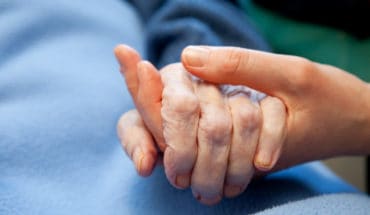Protecting the rights of older people to health and social care: The current health and social care crisis affects the whole of society but has greatest impact on older people. People aged 65 and over account for over 40% of hospital admissions, occupy around two-thirds of hospital inpatient beds and are the most frequent users of health and social care services.
It is older people who are most likely to be harmed by the current unprecedented waits for ambulances, prolonged time on trolleys in emergency departments, multiple moves within hospital and lengthy delays awaiting community services and social care for discharge. The cumulative impact increases their risk of dying in hospital or of leaving hospital less mobile, more confused, and more dependent than when they arrived.
When older people leave hospital in poor health, they need rehabilitation and support to recover. Without it, their health deteriorates further – already on average 15% of older people being discharged from hospital are readmitted within 28 days. With each admission their level of frailty and care needs increase, generating even more demand for health and social care at home or in a care home.
Up to 50% of people aged over 85 live with frailty and are at increased risk of deterioration from minor illness and events. Frailty costs UK healthcare systems £5.8 billion per year but can be slowed or reversed with the right prevention and care. Investing in community services for older people can significantly reduce emergency hospital admissions but primary care is overworked, community nursing teams are understaffed, rehabilitation services are working at full capacity, and care homes and domiciliary care providers are struggling to recruit and retain sufficient staff.
This crisis has been simmering a long time. There are no quick fixes. But it is critical that the government and Integrated Care Systems across the country make the right decisions in the short term. Decisions that make best use of available funding and workforce and invest in what works to reduce harm and improve outcomes for older people. Decisions that solve rather than shift problems. Decisions that avoid simply generating further demand and cost for the health and care system.
BGS highlights seven evidence-based short-term actions to take in this current crisis:
1. All older people with frailty should receive comprehensive multidisciplinary assessment as soon as possible after they arrive in hospital. This is often best achieved by dedicated services such as acute frailty units, or frailty assessment teams. Such teams can initiate early treatment to prevent deterioration and enable timely discharge to community services at home. We outline more about how to deliver such approaches in the Silver Book II.
2. There must be a focus on preventing, identifying and managing both deconditioning and delirium in hospital. Both are avoidable and are associated with increased length of stay in hospital and increased dependency on discharge. All hospitals should have a delirium policy in place as described in our Delirium Hub. Information on preventing deconditioning can be found in this resource from the National Falls Prevention Co-ordination Group.
3. The government, and health and social care providers, must protect and preserve the right to rehabilitation for all older people who need it. Effective care of older people with frailty requires early mobilisation in hospital, rapid establishment of rehabilitation goals, and continued therapy input until their condition has stabilised. The right to rehabilitation means that older people must be supported by rehabilitation multidisciplinary teams wherever they receive care. Where delayed transfers of care to community rehabilitation services are unavoidable, rehabilitation should commence in hospital. Older people with rehabilitation goals should not be transferred to a care home or community bed without assurance of appropriate rehabilitation being available. The principles of effective rehabilitation for older people are outlined by the Community Rehabilitation Alliance.
4. There should be continued investment in a multi-professional urgent community response that provides both intensive short-term hospital level care at home through Virtual Wards and Hospital at Home and access to goal-oriented home-based and bed-based reablement and intermediate care services. These must work closely with ambulance, ambulatory care and same day emergency care services as an integrated local network. We have written more about this in Right Time, Right Place and our position statement on Virtual Wards (Hospital at Home).
5. Investment in good quality healthcare support for care homes reduces avoidable hospital admissions. There should be continued efforts to implement Enhanced Health in Care Home models where it is possible to do so. These initiatives should focus on minimising inappropriate polypharmacy and discussing resident and family preferences about what should happen in the event of an acute healthcare crisis. We discuss priorities in healthcare for care homes as part of Ambitions for Change.
6. Services for older people living with multiple long-term should take a coordinated and person-centred approach, including the involvement of geriatric medical teams as appropriate. This can reduce unnecessary investigations and medicines, and support older people to make informed decisions about their future care, treatment and place of care.
7. Experts in older people’s care must be included in Government and NHS policy planning. Older people are the largest group of users of the NHS, accounting for 40% of hospital admissions. Older people are also the fastest growing age group, with the number of people aged over 85 projected to double by 2045.
Getting the right workforce in place – short and medium term
Supporting these actions will require creative and integrated workforce solutions including greater use of technology for professional-to-professional decision-making support, extended scope of practice, and some refocusing of roles. In the short term this could include, for example, asking specialists in care of older people (medical, nursing and allied health professionals) to focus exclusively on frailty-specific initiatives through winter and spring.
To move from a recurring cycle of crisis response in the longer term, it is important to recognise that there are currently not enough healthcare professionals across the multidisciplinary team to care for the complex needs of an ageing population. A workforce strategy must be published urgently, acknowledging this reality and setting out a plan to build multidisciplinary skills and capacity in caring for older people across the system. This should include proactive and personalised anticipatory care that helps older people stay independent and healthy for as long as possible. The role of nurses and therapists in leading such services must be recognised and a more integrated approach across care at home and community healthcare roles should be explored with some urgency.
Across health and social care, and around the country, colleagues tell us it is impossible to recruit the necessary expertise to deliver existing services. There are many reasons for this, but central to the solution is making sure people feel valued. We know that healthcare professionals across the country will be facing unimaginable pressure at work and experiencing moral injury as they are unable to deliver the level of care that they would wish to provide. We thank our members for their continuing service to the NHS and urge them to be kind to themselves and to each other as they continue to provide the best possible care in the worst possible circumstances.
The government must sit down with urgency to address the concerns raised by unions and professional bodies representing nurses, ambulance staff, allied health professionals and doctors to ensure that we can recruit, train and retain the people we need to deliver the best possible care for older people.
Professor Adam Gordon, President of the British Geriatrics Society, said:
‘While the current crisis in the NHS affects us all, it is older people who are bearing the brunt of it. It is predominantly older people who are stuck in ambulances outside emergency departments, on trolleys in hospital corridors, and waiting in hospital for care packages before they can be discharged. BGS members are working tirelessly to provide the best possible care to their patients, but they are exhausted and demoralised. We need the Government to act urgently to implement both short- and long-term changes to ensure that the NHS is there for older people when they need it most.’
Dr Sarah Clarke, President of the Royal College of Physicians London, said:
‘The current crisis is the result of long-term neglect of funding for health and social care. It is primarily an issue of not enough people to meet the demand for care. We expect the NHS workforce strategy to address that, but in the meantime we need to do all we can with what we have. That means being honest about the situation and prioritising the right solutions. Given that older people use the NHS more than any other group, caring for them well is key, helping them stay at home as much as possible and returning there safely and quickly when they do need to go to hospital.’
Professor Andrew Elder, President of the Royal College of Physicians Edinburgh, said:
‘The ageing of the UK population is a triumph, reflecting major improvements in socioeconomic conditions and in medical care in childhood and the middle years of life. With more of our population now living longer lives we must ensure that our NHS and social care services support those lives to be as healthy as is possible. This means investing in training – not just of doctors and nurses, but also the wide variety of other health and social care professionals we need to deliver high quality hospital and community care to older people. With our older population set to increase further, the time to act is now.’
The British Geriatrics Society is the professional body of specialists in the healthcare of older people in the UK. It has over 4,600 members from all professions working to improve healthcare for older people in acute, primary and community care settings.
- New lipid-based pathway discovered as key to memory formation - 25th June 2025
- Crucial link could explain how Alzheimer’s takes hold - 25th June 2025
- Understanding Your Mind Can Improve Daily Life - 25th June 2025







